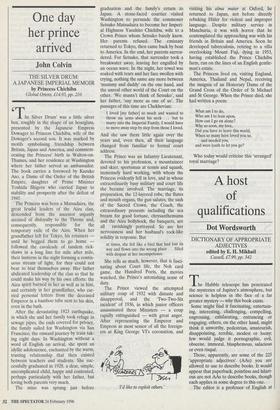One day her prince arrived
John Colvin
THE SILVER DRUM: A JAPANESE IMPERIAL MEMOIR by Princess Chichibu Global Orient, £14.95, pp. 210 The Silver Drum' was a little silver box, roughly in the shape of an hourglass, presented by the Japanese Empress Dowager to Princess Chichibu, wife of the Dowager's second son. It was marked by motifs symbolising friendship between Britain, Japan and America, and commem- orating the Princess' birth in Walton-on- Thames, and her residence at Washington where her father served as ambassador. The book carries a foreword by Kazuko Aso, a Dame of the Order of the British Empire, daughter of Prime Minister Yoshida Shigeru who carried Japan to stability and prosperity after the defeat of 1945.
The Princess was born a Matsudaira, the great feudal leaders of the Aizu clan, descended from the ancestor unjustly accused of disloyalty to the Throne and, consequently, responsible for the temporary exile of the Aizu. When her grandfather left for Tokyo, his retainers until he begged them to go home followed the cavalcade of tandem rick- shaws in a long line for mile after mile, their lanterns in the night forming a contin- uous stream of light, for they could not bear to tear themselves away. Her father abdicated leadership of the clan so that he could make his way by his own efforts: the Aizu spirit burned in her as well as in him, and certainly in her grandfather, who car- ried personal letters from the deceased Emperor in a bamboo tube next to his skin, even in the bath.
After the devastating 1923 earthquake, in which she and her family took refuge in sewage pipes, the ends covered for privacy, the family sailed for Washington via San Francisco, the onward journey by train tak- ing eight days. In Washington without a word of English on arrival, she spent an idyllic adolescence, enchanted by the warm, trusting relationship that then existed between teachers and students. She suc- cessfully graduated in 1928, a dear, simple, uncomplicated child, happy and contented, perhaps particularly with her father, but loving both parents very much.
The mine was sprung just before graduation and the family's return to Japan. A stone-faced courtier visited Washington to persuade the commoner Setsuko Matsudaira to become her Imperi- al Highness Yasuhito Chichibu, wife to a Crown Prince whom Setsuko barely knew. Her parents refused. The emissary returned to Tokyo, then came back by boat to America. In the end, her parents surren- dered. For Setsuko, that surrender took a breakwater away, leaving her engulfed by an ocean wave. In the night, her towel was soaked with tears and her face swollen with crying, nothing the same any more between `mummy and daddy' on the one hand, and the unreal other world of the Court on the other. 'We mustn't think of Setsuko', said her father, 'any more as one of us'. The passages of this time are Chekhovian: I loved [my father] so much and wanted to throw my arms about his neck . . . but to many into the Imperial Family, I would have to move away step by step from those I loved.
And she saw them little again over the years and, even then, all their language changed from familiar to formal court address.
The Prince was an Infantry Lieutenant, devoted to his profession, a mountaineer and skier, sportsman at tennis and squash, immensely hard working, with whom the Princess evidently fell in love, and in whose extraordinarily busy military and court life she became involved. The marriage, its preparation, the 12-layered robe, the flutes and mouth organs, the gun salutes, the sash of the Sacred Crown, the Coach, the extraordinary presents including the sea bream for good fortune, chrysanthemums and the Aizu hollyhock, the banquets, are all ravishingly portrayed. So are her nervousness and her husband's rock-like solidity in response. But
at times, she felt like a bird that had lost its way and flown into the wrong place . .. filled with despair at her incompetence.
She tells us much, however, that is fasci- nating about Court life, the Noh card game, the Hundred Poets, the movies watched, the Prince's astonishing sense of duty.
The Prince viewed the attempted military coup of 1932 with distaste and disapproval, and the 'Two-Two-Six incident' of 1936, in which junior officers assassinated three Ministers — a coup rapidly extinguished -- with great anger. After representing the Emperor and Empress as most senior of all the foreign- ers at King George VI's coronation, and `I'd like to exploit others.' visiting his alma mater at Oxford, he returned to Japan, not before directly rebuking Hitler for violent and improper language. Despite military service in Manchuria, it was with horror that he contemplated the approaching war with his friends in Britain and America. Soon he developed tuberculosis, retiring to a villa overlooking Mount Fuji, dying in 1953, having established the Prince Chichibu farm, run on the lines of an English gentle- man's estate.
The Princess lived on, visiting England, America, Thailand and Nepal, receiving the insignia of an Honorary Dame of the Grand Cross of the Order of St Michael and St George. When the Prince died, she had written a poem: What am Ito do,
Who am I to lean upon, How can I go on alone?
Why so soon, my love, Did you have to leave this world, When so many here loved you so, and needed you, and were loath to let you go?
Who today would criticise this 'arranged' royal marriage?


























































 Previous page
Previous page